Why does my cat attack me?

All cat owners like to pet them quietly while they are purring, but this moment of relaxation can become a nightmare when our cat attacks us suddenly and without previous notice it scratches us or bites us.
Most of the attacks take place while we caress our cat or when we are playing with it, but some owners fear attacks from their cat even when they are sitting quietly watching television or when they are sleeping, the attacks and their severity vary greatly depending on the cases .
To solve this problem, the first thing is understand the cause of these aggressions. In this article .com we will see the different reasons that explain why our cat attacks us.
Aggression for medical problems
If suddenly your cat has an aggressive behavior, the first thing is to take it to the veterinarian to verify that it does not have a health problem.
Rage or a hormonal problem can cause aggressive behavior, but if the cause is a health problem, a very common cause is arthritis. Some cats with neurological problems may have sudden moments of very intense pain.
If the physical examination of your cat by the veterinarian does not allow to isolate the problem, it is possible that an X-ray allows it.
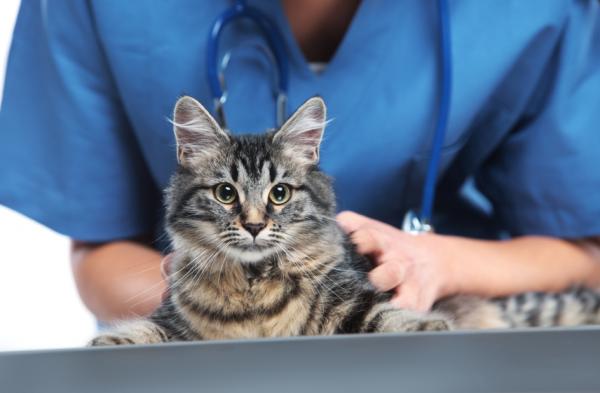
Aggression per game
The cats they are predators and it is something innate in them perform play behaviors when they are puppies to train to hunt real prey once adults. It is not uncommon to see a kitten attacking the owner’s feet or hands, and however cute this behavior may seem, if it continues to adulthood it will be a problem.
Game-like attacks are frequent behaviors in young kittens and when they remain in adulthood it is because the cat “learned” this behavior.
Often they are the owners of the cat that teach to attack game mode. When the cat is small they play with it moving their hands or feet as if they were prey for the kitten to attack them, because when a kitten does it can seem funny and endearing. However, with this act we are teaching him a behavior that he will maintain during adulthood, not for malice but for fun and because he really believes he can do it.
Another cause of game mode attacks is el boredom. Playing with our cat with objects designed for it instead of with our hands or feet is good. But if these play sessions are infrequent or if our cat spends its day bored in a closed room, the cat will be overexcited when they occur and could attack us for excess energy.
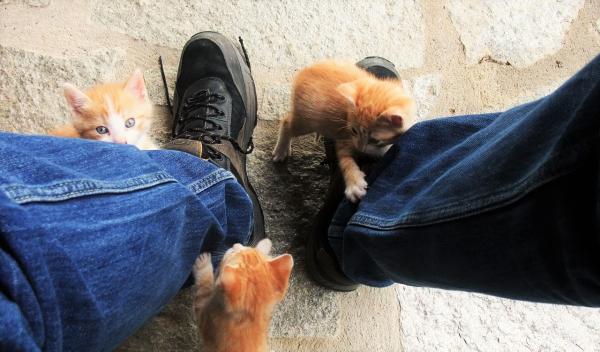
Aggression for fear
A cat that is afraid typically adopts a crouched position with its ears back and its tail curved inward, tilting its body backwards to get away from the threat.
The scared cat You have three options: flee, immobilize or attack. If a scared cat has no escape and the “threat” is still present after immobilizing a few seconds, it is very likely to attack.
A cat that has not been properly socialized When I had from 4 to 12 weeks I can be fearful and distrustful of humans and exhibit this behavior. But it can also happen with a properly socialized cat that is in a new environment, or with a stranger or in the presence of a new object that can scare you like a dryer in operation.
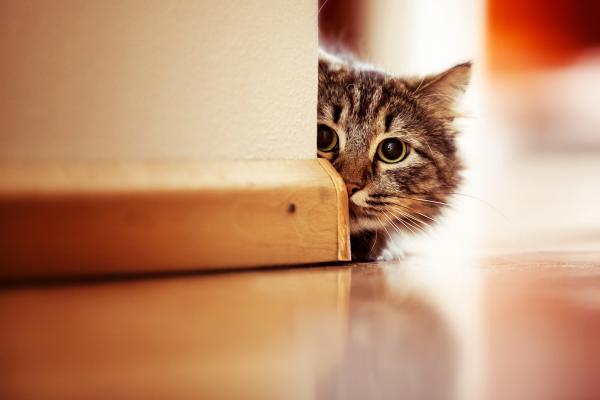
Territorial aggression
A cat can attack a human to defend a area of the house that you consider yours: the human is then considered a threat that could take away his territory.
This type of aggression usually occurs towards strangers or people who do not usually come to the home a lot. Cats that exhibit this behavior usually to pee in the area that they consider as their territory to mark it. Discover how to prevent your cat from urinating at home.
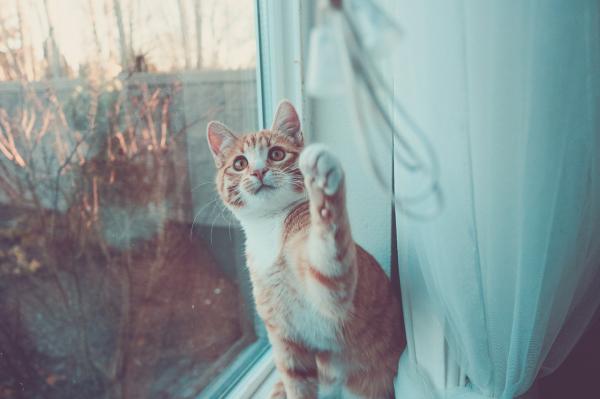
Aggression by dominance
Some cats act with their owners as if they were other cats and they try to dominate them for this on top of them in the hierarchy order home. Cats begin to show subtle signs of aggression at first the owner can misinterpret with simple game, later the cat growls or hisses towards their owners and may bite or scratch.
The dominant cats are also very territorial, which means that aggression by dominance can be coupled with territorial aggression.
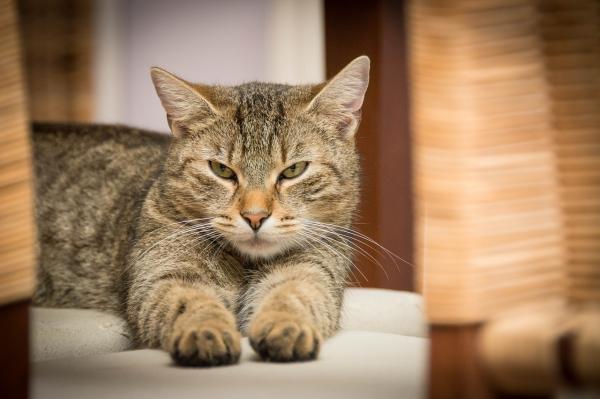
Re-directed aggression
The redirected aggression is a peculiar phenomenon that consists of a cat angry or stressed by something or someone does not attack the person or animal that is the cause of his anger but that redirects his aggression towards his owner. The tension due to the cat’s anger can be withheld for a long time and only attacks later.
The victim of the cat’s attack has nothing to do with his anger, but then, when he sees his victim again, the cat remembers his anger and attacked her again.
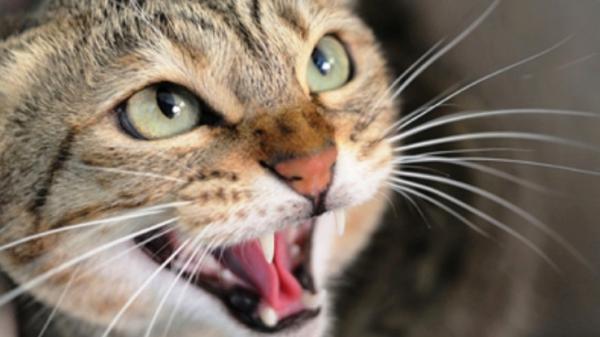
Aggression because he does not want to be caressed anymore
A cat can attack you because it bothers you that you caress him, it can be for two reasons:
- One reason is that this cat has not been properly socialized and does not understand the friendly intentions of a human who caresses him.
- The other cause is that he is simply not used to receiving pampering or is very sensitive and after a while it bothers him and attacks you out of irritation.
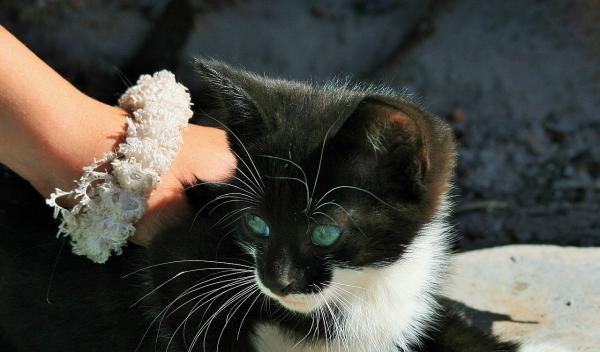
Maternal aggression
All cats that are mothers Puppies are very protective of them, and if they perceive a threat they can attack people or animals they usually trust. This reaction is due to the hormones of the cat and is more intense during the first week after delivery and then it decreases progressively.
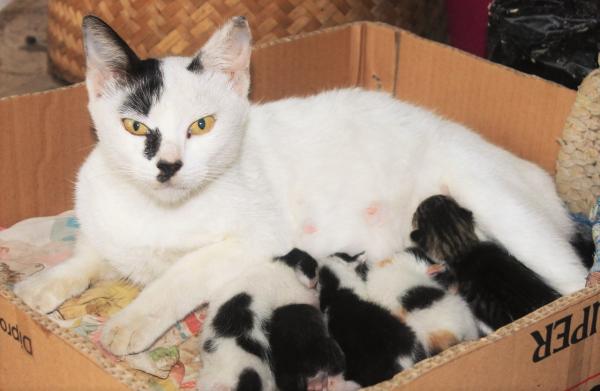
How to manage the situation
Each case is different and requires a specific management, now that you have read this article you can know why your cat attacks you and it will be easier for you to adapt your behavior to solve the situation.
The important thing is always be patient with your cat and not put in a situation of fear or stress that causes this type of aggressive reaction. You can use positive reinforcement, like caresses or a piece of cheese when your cat behaves well.
With patience and understanding the reasons of your cat’s behavior can help you improve your behavior.

If you want to read more articles similar to Why does my cat attack me?, we recommend that you enter in our behavior problems section.












Hello!
After reading this article and see some videos of your channel, I still do not know why the behavior of my cat: normal is quite nice and playful, ask for cuddles and normal cats that attack to say “enough” when they tire of them.
The problem is that it already has several very unpleasant episodes of aggression motivated because he is not allowed to do something. For example, if I do not let him get on the counter or when he gets heavy and tries to steal food from my plate. What I usually do is block it with the body or arm and say NO resounding, but it’s as if it feeds back your frustration and angry mauling. If the thing lengthens, then it enters aggression mode focusing its anger against me, throwing its ears back and taking impulse to attack me and bite me with “bad slobber”. At this moment I usually block it with what I have on hand, and it gets even more angry – in fact, it is that if I ignore it and I go somewhere else, it chases me to give me a thump xD-. What I do is take her to the mother cat and her out of the room in which the application is (with the painful meow consequent “aaayy, which has left me fueeeeraaaaa, aaayyyy, penita me!” XD) You are only so happens, and when he sees me again after a while, it’s as if nothing happened.
The kitten has already 8 months and is sterilized. We thought that sterilizing her would calm a little but no, it is exactly the same. We live in a flat pulling a little but totally catty.
Is it a passenger? Should we worry? What is the best way to calm these anger by “teenage frustration”?
Best regards and thanks!
Hello Martina, it is likely that there is a social conflict that you are favoring with some management errors. It is not positive to take it “to the mother” and take it out of the room if it is especially stressed. Aggression is a problem of serious behavior that, if not treated, can go further and greatly harms the welfare of animals.
I would advise you to learn more about feline language and education through positive reinforcement. On the other hand, it would also be basic to avoid conflict with her as much as possible. You can try to improve your day to day and the association you have with food, tasty, games, kind words and the use of enrichment: https://www.expertoanimal.com/enriquecimiento-ambiental-para-gatos-todo-lo- what-must-know-22569.html
Dedicate every hour and if after one or two weeks you do not see evident improvement, then I advise you to consult with a veterinarian specialized in ethology.


